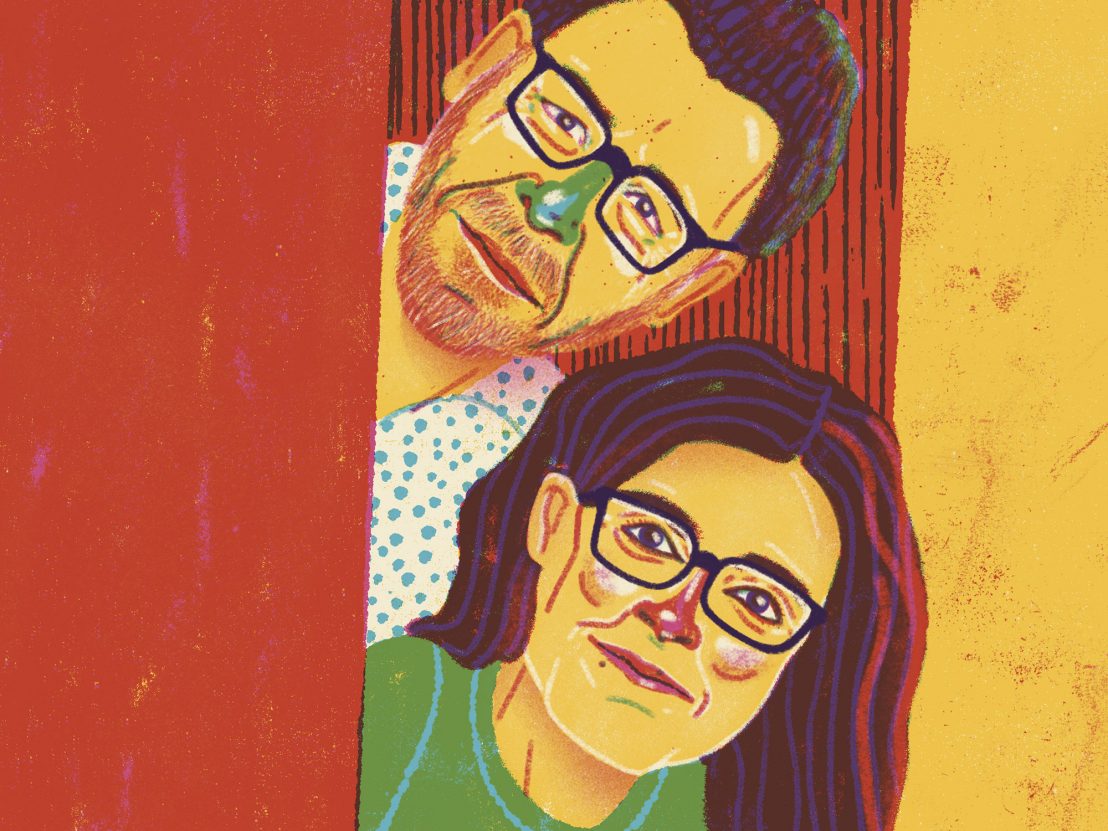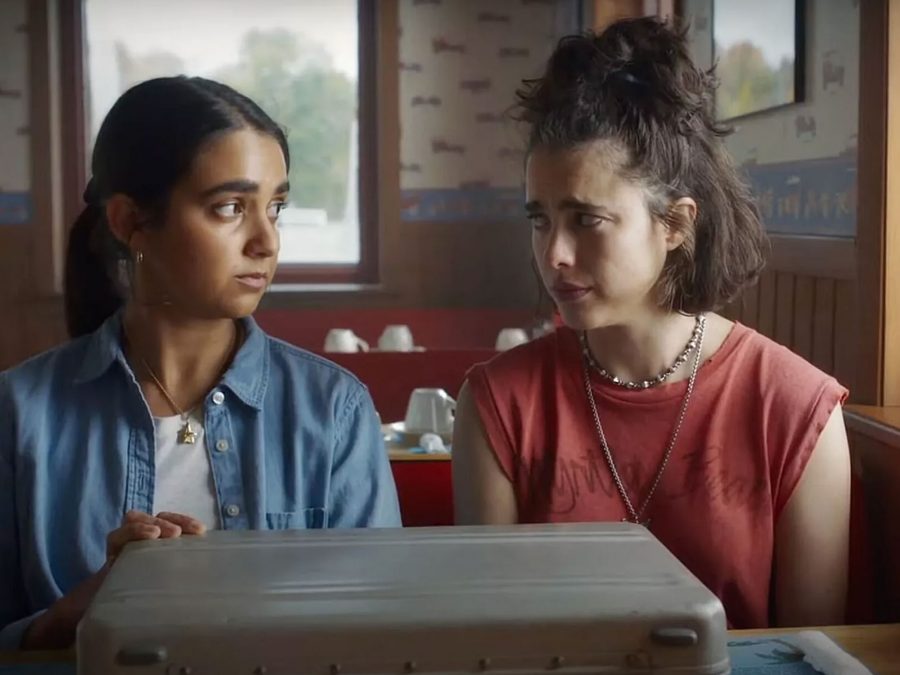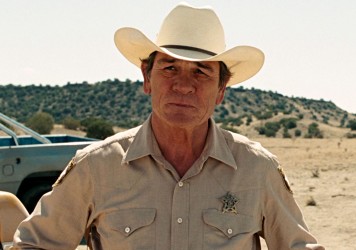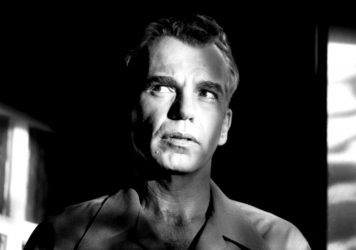
The married duo behind Drive-Away Dolls bicker about Russ Meyer and reveal their plans for queer comedy genre movie domination.
The idea for Drive-Away Dolls was born in a bar – it’s been a long time coming since. Husband-and-wife duo Ethan Coen and Tricia Cooke realised their script together, about two lesbian best friends who embark on a road trip from Tallahassee to Florida that sees them inadvertently swept up in a lurid political conspiracy.
LWLies: Drive-Away Dolls was a long time coming – it’s my understanding it developed out of a mutual appreciation for Russ Meyer. What is it about his films that stuck with you?
Ethan Coen: Well, we both really do love Russ Meyer films in spite of the fact that neither of us has ever seen any. We like the idea of Russ Meyer films. Have you seen any?
Tricia Cooke: Yes.
EC: What did you see?
TC: This has come up before and you asked me, and I can’t remember. For me, it’s more Doris Wishman than Russ Meyer. Russ Meyer is a name that gets bandied around by us because it’s the most recognisable of the B-movie names, but his are just cheap, fun movies.
EC: I’ve never seen any Doris Wishman either.
Tricia, what would you recommend to someone who has never watched any Doris Wishman movies?
TC: Bad Girls Go to Hell is her classic film.
EC: I haven’t seen it, but I imagine it’s pretty bad.
TC: It’s great! I just saw it again. It totally holds up.
EC: Okay. I’m thinking of Faster, Pussycat! Kill! Kill!. That’s probably bad. Sometimes there’s just a good title. We wanted to do a movie that was like those titles more than like those movies.
TC: Yeah, the idea originated from a friend of mine and I – we came up with it at a bar. One night we’re like, ‘Drive-Away Dykes’, what a great name for a movie. We just wrote a movie based on the title.
EC: I’m not even condemning you for that. First of all, because you say it isn’t true, you have seen those movies. But also, you know, me and Joel wrote a movie based on ‘The Odyssey’ and we’ve never read ‘The Odyssey’.
TC: I’ve read ‘The Odyssey’ too.
I love the title and I was very upset that it had to change. Was that purely a studio request?
EC: It was awful because it’s such a good title. And people should refer to it by its real street name, Drive-Away Dykes and not by the studio name, Drive-Away Dolls.
TC: We only ever refer to it as Drive-Away Dykes because it’s been that for so long. But yeah, it was more of a studio, ‘We can’t sell this’ thing.
EC: And also, to be fair to them, they kind of laughed at the title and kind of liked it. But you know, the reality is some theatres just won’t book it with that title. They won’t put that name on the marquee, there are places where you can’t have that. So we can’t blame the studio. But it’s terrible.
Since you mentioned a mutual love of B-movies – is this film a response to a type of cinema that you feel isn’t been made anymore?
TC: Yeah, I identify as queer, and y’know, when we wrote it 20 years ago, there just weren’t that many queer or lesbian genre movies. There were great films like Go Fish, But I’m a Cheerleader, that had some humour, but most were dramas or coming-out stories. Being part of a marginalized group you have to deal with a lot of trauma and drama and everything, and I feel like that most of cinema that’s made around a queer experience is, you know, a little heavier. Nothing that was just like incredibly lighthearted and kind of silly.
EC: Yeah, and when we wrote the movie 20 years ago, we couldn’t get it made because it was inconceivable. If it was a lesbian movie, it had to be an important drama. It couldn’t just be lesbian and fun. Now you kind of have permission to just do a fun movie with lesbian characters. I’ve gotta tell you what Kristen Stewart said about the movie. She read it and said, “We need this stupid movie!”
TC: Yeah. It was about saying, “Let’s just make something light and something that people can laugh at or even think is a little trashy, that doesn’t take itself too seriously.” It felt like something that there should be more of. We’ve written a couple of other lesbian genre movies, because I feel like that’s a niche that hasn’t been filled yet.
There’s a lot of sex in the film, which is something that again feels like we don’t see a lot at the cinema now, especially queer sex. And there’s traditionally not been a lot of sex in Coen films either…
EC: I’m going to sit here quietly.
TC: I’m very sex-positive. And I agree, I think that there’s often a lot of embarrassment around sex, there’s shame around sex, if you have too much sex, you’re considered a slut. But I think, let’s just embrace love and sex, especially if it’s good humour and not super crass. Though I’m not against crassness. I remember coming out, and seeing two women kiss on screen – that was a big deal. I remember being so moved by that. And it just feels like sex toys and sex shops and all of that should be celebrated.

You mentioned that you’ve been writing more of these queer scripts – do they feature the same characters?
EC: I’m not quite sure what we can say. We can tell you Margaret is in the next one, but she’s not that character.
TC: She’s a different character. The next movie we wrote is a detective movie. It’s like a film noir….we’re not supposed to say that. It’s a modern contemporary detective story. Kind of a throwback to The Long Goodbye.
I love this idea. We’ve had the queer road movie. We’ve got the queer detective story. We could do a quick sci-fi thing, make it 80 minutes.
TC: And the detective script is shorter on page, it might be like an hour-long movie. Who knows?
EC: I don’t know if you can be queer in a space suit.
TC: Of course you can be queer in a space suit! You can be any you can be anything in a space suit. The space suit gives you liberty.
EC: Well, I’m learning.
I was very interested in the trajectory of Jamie and Marian’s road trip which takes them from Tallahassee to Florida, as Florida has quite a reputation even within the States as a zany sort of place. Was that a guiding thought in the writing process?
EC: That’s a really interesting question. It’s interesting because I can’t even remember why it ended up being Florida.
TC: I think we had it in Florida because it seemed like a natural place if they were going down south, and exploring different cultures and different types of queerness. I think we had been to Tallahassee right around the time we wrote it. And Florida… it feels like it’s now much more conservative than it was. It’s always been this crazy diaspora of people and cultures and queerness and conservativeness, like Key West and Miami are both very queer. There wasn’t a political intention when we were writing it, but now with people like Rubio and DeSantis, there are so many enemies to the queer community down there, it kind of worked in our favour. I always think about the Bugs Bunny cartoon where he’s just sawing off Florida [laughs]. But they’re good people down there.
Tricia, having worked in editing for a long time, how did the experience differ when you were editing something you’d co-written? Were you able to think about editing while you were writing?
TC: Having a background in editing is probably my greatest strength while writing, because I approach the process like, ‘Okay, what’s going to be dynamic to cut to? What’s going to be interesting to look at? What’s going to move the story along in a way?’ So I didn’t have any problems in writing as an editor, but there were times in the cutting room when I felt like maybe someone else should be looking at this. We did get other editor friends to come in and give us notes, because I sometimes wished I had a different mind – like if I didn’t know the story so well, I could be more objective.
EC: It should be said, Trish is in every way except name the co-director of the movie. Writing, directing and cutting a movie together is something I’ve been doing forever, as I’ve been making movies with Joel. You don’t even distinguish the writing and directing and editing, you’re visualising the movie in the same way. It’s all making the movie and those title distinctions are a little artificial.
I really enjoyed Bill Camp popping up as Curly, who runs the drive-away. He’s someone who feels like he should have already been in a Coens film, because he’s got the face for it. He takes a bit of a beating in the film. What I really need to know is if Curly’s okay.
TC: You know, it’s funny, we thought, if we’re going to make this a trilogy, we should put Curly in every one of the movies.
EC: I don’t know what to tell you, Hannah, if you want him to be okay, yes, he’s okay.
TC: He’s totally okay. We definitely wanted him to live at the end of the movie.
EC: We kept telling him he’s the main character in the movie. He’s the centre of the movie. It’s all about Curly.
Eighty minutes is an unusual runtime in this day and age – was this length especially a throwback to the B-movie runtime?
TC: Yeah, we certainly didn’t think it was going to be that short. It was over a hundred-page script, you know, and all of a sudden, we’re like, ‘Damn, this is only 75 minutes.’ But we figured, there’s so many other movies out there right now that are three and a half hours long, that maybe an 80-minute movie isn’t so bad.
EC: I haven’t seen the new Scorsese movie yet because it’s three-and-a-half hours. I’m sure if I saw it, I’d like it, but it’s hard to see for me. Our movie, it might not be good, but at least it’s short. You can put that on the poster.
Published 12 Mar 2024

Margaret Qualley and Geraldine Viswanathan star in a delightfully daffy road movie, written by Ethan Coen and his wife Tricia Cooke.

By Paul Risker
Hail, Caesar! is the latest entry into the directors’ career-long reframing of their country’s storied past.

By Dan Einav
The Man Who Wasn’t There is a film without levity, hope or redemption – and it’s one of the directors’ very best.